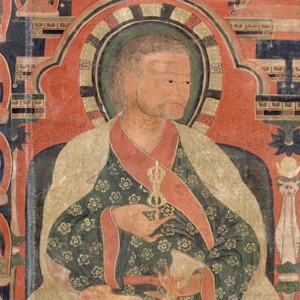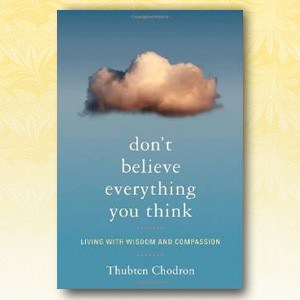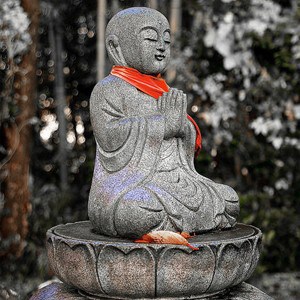Parting from the Four Clingings
Parting from the Four Clingings

-
My teachers, who are so kind,
Meditation deities so compassionate—
To you I go for refuge from my heart;
Pray, bestow your blessings upon me. -
Conduct contrary to the teachings has no use;
Thus to act in accordance with the teachings,
There is the instruction on parting from the four clingings;
I offer this to your very ears. -
If you cling to this life, you are not a practitioner;
If you cling to the three realms, that is not renunciation;
If you cling to self-interest, you are not a bodhisattva;
If grasping arises, it is not the view. -
First, not clinging to this life;
Ethical discipline, study, reflection, and meditation—
One who pursues these for this life’s sake
Is not a practitioner; so cast this aside. -
First to explain ethical discipline:
It’s the root of higher transmigration;
It’s the staircase to liberation;
It’s the antidote to suffering; -
You cannot succeed without ethical discipline.
As for ethical discipline that clings to this life,
Its root is in the eight worldly concerns;
It attracts accusations of immoral behavior; -
It makes you jealous of those with ethical discipline;
It makes your own discipline a mere pretense;
It’s the seed that creates lower transmigration;
So cast aside the pretense of morality. -
Those who engage in study and reflection
Are enriched by resources that enhance knowledge;
They are endowed with the light that dispels ignorance;
They are familiar with the road to guide sentient beings; -
They are endowed with the seed of the dharmakaya;
You cannot succeed without study and reflection.
As for the study and reflection that clings to this life,
It provides resources that produce conceit; -
It causes contempt for those inferior in learning and reflection;
It causes envy toward those who possess learning and reflection;
It causes you to seek retinues and wealth;
It’s the root that brings forth lower transmigration. -
So cast aside study and reflection driven by the eight concerns.
All who undertake meditative practice are
Endowed with the antidote to the afflictions;
They possess the root of the path to liberation; -
They possess the seed of Buddhahood;
You cannot do without meditative practice.
As for meditative practice pursued for this life’s sake,
It brings distractions when residing in solitude; -
It makes you adept in the art of empty chatter;
It makes you defame those engaged in study and reflection;
It makes you jealous toward other meditators;
So cast aside the meditative concentration of the eight concerns. -
To seek nirvana, the state beyond sorrow,
Relinquish clinging to the three realms.
To relinquish clinging to the three realms,
Reflect on the defects of cyclic existence. -
First is the duhkha of pain—
This includes the sufferings of the three lower realms.
If you contemplate these well, fear will arise,
For if ripened upon you, they are indeed unbearable. -
Not gathering the virtuous karma that overcomes these
And continuing to cultivate the fields of lower realms—
Wherever such conduct exists, spit on it. -
Reflect on the duhkha of change—
From higher realms you can fall to the lower realms;
The god Indra can be reborn as a mere earthling;
Sun and moon can turn into darkness; -
A universal monarch can be reborn as a servant.
These can be known by means of scripture,
But cannot be perceived by ordinary beings.
Therefore, observe your own experience of human-level changes: -
A rich person turns into a poor one;
A confident person changes into an anxious one;
Many people unite together as one;
This list of such phenomena is inconceivable. -
If you reflect on the duhkha of pervasive conditioning,
Karmic deeds are endless—
You suffer with too much, you suffer with too little;
You suffer if rich, you suffer if starved. -
We waste our entire lives in preparations;
While in preparation we all die.
Even in death there is no end to preparations,
For we begin preparations for the next life. -
Spit on those who continue to cling to
This mass of suffering called cyclic existence,
When freed of this clinging, you go beyond sorrow;
When gone beyond sorrow, you attain happiness. -
Freedom from these two clingings is the experience of expanse.
Your individual freedom alone is of no value.
Beings of the entire three realms are your parents;
Spit on those who leave their parents behind
In the storm of suffering and seek their own happiness. -
May the sufferings of the three realms ripen upon me;
May sentient beings receive all my merit;
Through the blessings of this meritorious act,
May all sentient beings become fully enlightened. -
In whatever way you abide in reality
There is no release so long as you grasp.
To explain this in greater detail: -
There is no liberation for those who grasp at existence;
There is no higher rebirth for those who grasp at nonexistence;
Those who grasp at both are ignorant;
So place your mind freely in the nondual sphere. -
All things are but objects of the mind;
Without searching for a creator of the four elements,
Such as a wise diviner, Isvara, and so on,
Place the mind freely in the sphere of mind-itself. -
The illusory nature of [all] appearances
And [the truth of] dependent arising as well—
One cannot describe their true mode of being;
So place the mind freely in the ineffable sphere. -
Through the merit derived from this virtue
Of presenting parting from the four clingings,
May all beings of seven classes without exception
Be led to the ground of Buddhahood.
This instruction on parting from the four clingings was composed by the yogi Drakpa Gyaltsen (1147-1216) at the glorious monastery of Sakya.


